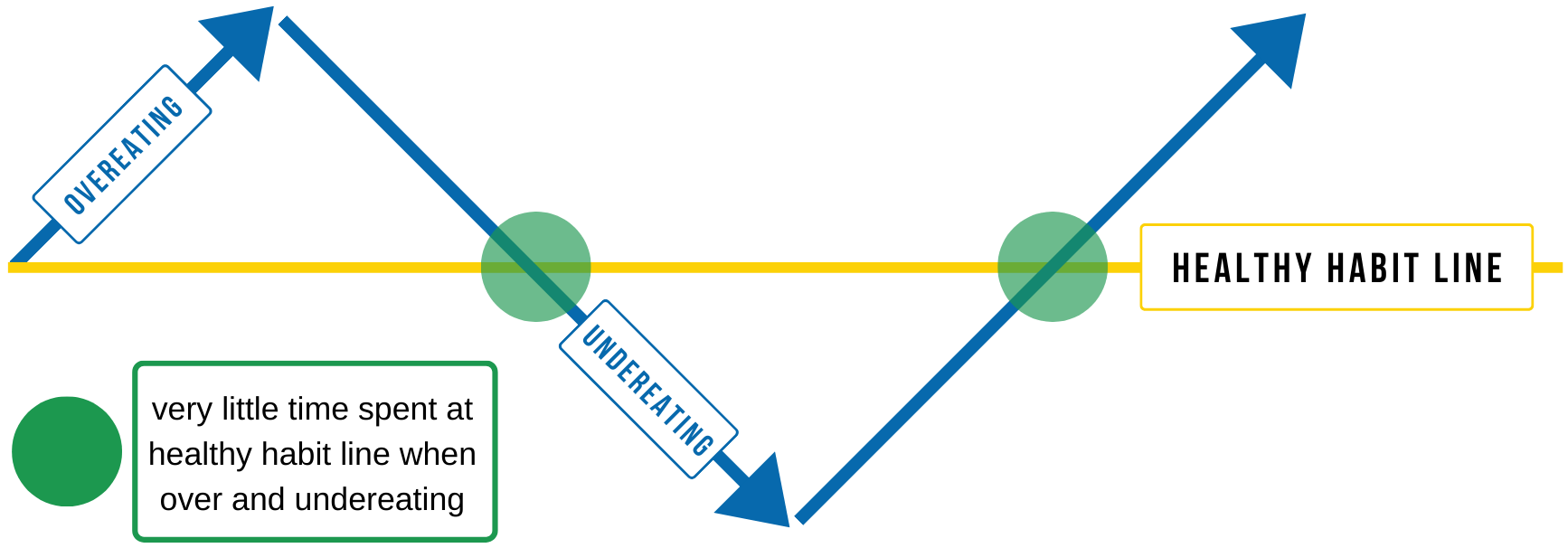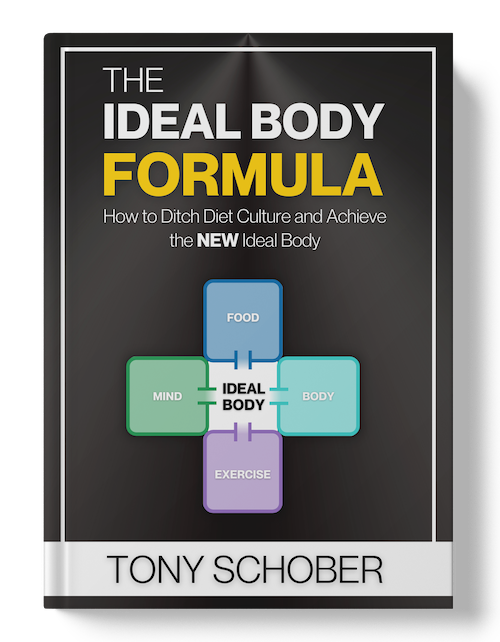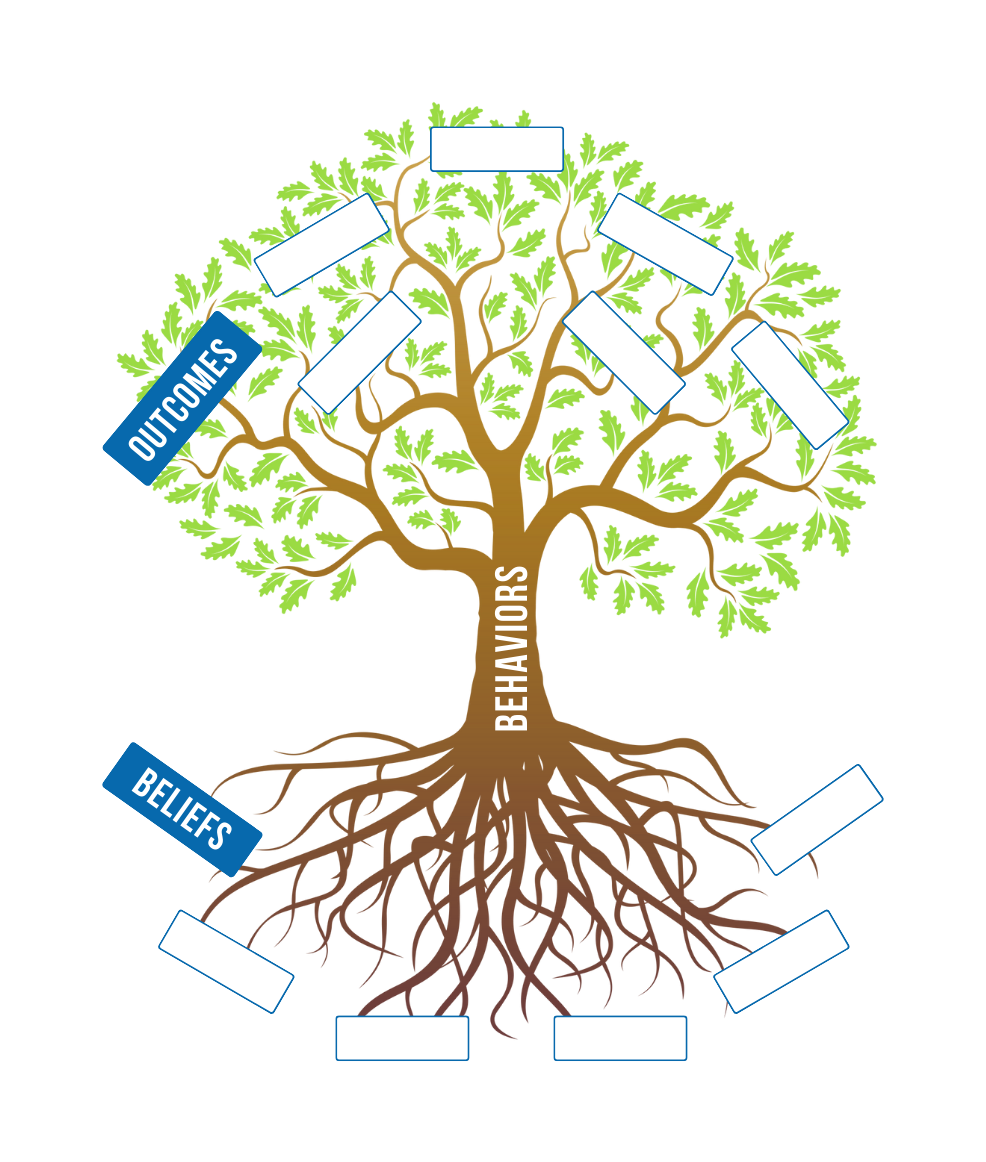Struggles & Breakthroughs
A member of our Built Daily community submitted a great question for our weekly live coaching call. She had been triggered by her body and was listening to our Fitness & Sushi podcast. On the episode, Deanna and I were sharing our own personal struggles.
When this member heard us talking about our struggles, she thought “if these professionals in charge of teaching me how to feel better about myself can’t feel ok about themselves, then why am I bothering?!?”
To be perfectly honest, when I first read it I felt a bit of shame. She’s right… who am I to teach people how to get over their food and body struggles when I struggle myself? I spent the day thinking about this question and reminded myself of one very important fact – to struggle is to be human.
As a society we have this utopian view that we aren’t supposed to struggle. We see happy people, confident people, people who seem to have their shit together, and assume they don’t struggle. They do.
Not a single person will honestly tell you they don’t struggle. In fact, it’s the struggle that leads to the breakthrough of a better life. The discomfort of the struggle is the currency of transformation.
It’s not about never struggling. It’s about learning to navigate the struggles more effectively and growing. It’s about normalizing them so you stop trying to avoid them, and instead embrace them as opportunities for personal growth.
Nobody wants to struggle. It’s uncomfortable. I like my comfort zone as much as the next person. It feels good. But here’s the thing – change doesn’t happen in your comfort zone. And let’s be real, it can be very uncomfortable in your comfort zone anyways. There’s discomfort in hiding from your struggles and spending a lifetime dieting and hating your body. And there’s discomfort in facing your struggles and growing. But only one of those discomforts is going to result in an improved life experience. So if I’m going to choose to be uncomfortable, I’m at least going to expect a positive outcome to come along with it.
Struggles lead to breakthroughs. Your breakthroughs are born from your struggles. They are opposite sides of the same coin. For every struggle you overcome you experience a breakthrough that will change your life. The bigger the struggle, the bigger the breakthrough.
That is what transformation looks like. It isn’t pretty. It doesn’t look like what you see in transformation photos. It’s not an external phenomena – it’s an internal remodeling of your mind, of which your physical body becomes a side effect.
Transformation isn’t some distant outcome of the future – it’s an ongoing process that happens in the now. It’s that moment that you don’t give up. Each and every time you struggle and break through you experience transformation. You transform yourself over and over again – for a lifetime. Each breakthrough changes you on a deeper level. You think differently. You see yourself differently. You act differently. And that’s when new outcomes are created.
The before & after photos you see aren’t transformation – that’s just body change. There are plenty of people who experience transformation without any change in external appearance. That’s because transformation is a change of identity. You change who you are. You take on your struggles and become a different person. And as a result, your life experience changes and improves.
The more you can understand this the more you can stop running away from the discomfort of struggle. Because avoiding it isn’t going to fix anything. It will only push the same struggle into the future to be dealt with at that time. Struggles never disappear unless they are directly addressed.
You’ve been so close to changing your life so many times already. You’ve taken dozens of different approaches, and they’ve all lead you to that inflection point. This convergence to a single moment happens for a reason – it’s a test to see if you’re ready for the other half of your journey.
Future you, the one who lives a life feeling free around their food and body, is looking back at you just waiting to meet you on the other side of that inflection point. It reminds me of a metaphor of a dog wearing a shock collar for an invisible fence. They stay within their comfort zone because the boundary of it is painful. But there is no physical barrier holding you or them back. There will be pain to overcome if you want to break free, but your freedom is on the other side. It’s time for you to break through that invisible fence and live the life you’ve always wanted.
This pain and discomfort are assets in disguise. They are guideposts letting you know you’re on the right track. They show you exactly what’s standing between you and transformation. The wall of struggle is there to show you where you need to go – not where you need to stop. In time you will even welcome them – seeking them out because you know a breakthrough is on the other side.
Everyone who has ever achieved something great in their life has experienced struggle. And the greater the achievement, the greater the struggles. The most successful people have struggled and failed the most. They just know how to use struggle as a means to empowerment, instead of letting struggles keep them stuck.
Deep down we know this is true. Yet we still try to take the easy route. We take pills. We follow cookie-cutter meal plans. We think we’re going to discover some kind of shortcut. We think we’re going to change without experiencing transformation. But when you avoid the struggle you’re avoiding transformation. The only way to get to the outcome you want is to go straight through it all. No detours. No shortcuts.
If you can change your mindset and start seeing struggle as a good thing, in time you will start to trust the process. You will experience the cause and effect of seeking out and persisting through the struggles. You will experience the breakthroughs and change. Each time this happens you will grow more confident in your ability to overcome obstacles, and more excited about the personal growth that’s imminent.
Setting Intentions
Every Monday in our Elite community we set our intentions for the week. Everyone takes a few minutes to write down and share what they plan to focus on.
Intentions are very similar to goals, but there is a slight nuance to them. For starters, goals have a certain meaning attached to them that make them pass / fail. We are even taught that SMART goals (specific, measurable, attainable, realistic, and time bound) is the best way to approach your desired future.
I disagree, and in practice we’ve found that these goals fail at attainment just as much as diets do. Why? Because they are outcome focused and very black and white in nature. You either achieve them or you don’t. You either succeed or fail.
That reinforces the idea that transformation is some specific event in the future, as opposed to an ongoing process of struggles and breakthroughs. A SMART goal is something like, I’m going to lose 10 pounds in the next month. Yes, it’s specific, measurable, attainable, realistic, and time-bound. It checks off all the boxes. Yet I’m sure your experience has shown you that this goal usually doesn’t get achieved.
Intentions are different. Intentions are like putting on a new pair of glasses and seeing your world through a new lens. If your intention is to work on your emotional eating struggle, then you end up navigating your environment differently. You see food differently. You notice different emotions. You become more aware of your unmet needs. And you don’t beat yourself up when you don’t fix a lifetime struggle in one week.
Your intentions are like goals, but they don’t have to be fulfilled and crossed off your list for them to be effective. Intentions allow you see your world differently and gather information and data that you wouldn’t otherwise see. As you internalize this input, it changes you on the identity level, and you tend to gravitate towards your desired experience over time.
Goals aren’t bad. They are nice to have as a sort of north star. They allow you to have a general idea of the direction you’re going. But beyond that, most people don’t achieve the goals they set for themselves and maintain what they achieved. SMART goals plus willpower can get you results, it’s called dieting. You can lose 2lbs this week or 10 pounds this month, but if you’re just focused on the outcome at all costs, results will be temporary.
Intentions are process focused. They help you tune into what you want to work on. They redirect your attention to what matters and allow you to filter out all the environmental inputs that don’t.
Will you “achieve” your intention the week you set it? Maybe, but maybe not. Either way it is not a failure, because intentions aren’t pass / fail. Most of the time you will set an intention and then will continue to set that same intention week after week. Each week you continue making progress. You address your struggles and have small breakthroughs. You’re never starting over.
There are times when I’ll work on trying to improve my weekend eating for an entire month. Each time I “wave” through the weekend I gather more information. My intentions allow me to see my weekends differently. I’m more self-aware when they come, and the intention lenses I’m wearing allow me to see the inner workings of my relationship with food better.
I make it through the weekend and I assess and think “I wasn’t really needing that particular food. I already felt satisfied. Next week, if it feels right, I will try eating this other thing instead.” Then when the weekend comes and the action fits – I plug it in. I might go through this process for weeks or even months.
But that’s the difference between intentions and goals. Intentions allow you to actually heal and improve your relationships with food, body, exercise, and mind. Struggles finally get overcome. So results are then permanent. Goals just attempt to get you to skip to the end outcome by a circled date on the calendar. The struggles just get bandaged over. Everything you do becomes a means to an end. And the results, if they even happen, rarely last.
Process vs Outcome
Diet Culture has a tendency to make us too outcome focused. Everything we do then becomes a means to an end. We try to strong-arm our calorie intake. We try to force the number on the scale to go down. And that usually ends with you feeling frustrated, or worse, wanting to give up.
The frustrations you feel on your Ideal Body journey tend to be a sign that you’re being too outcome focused. Anyone who has ever asked -“what’s the point?” when the scale isn’t moving the way they want it to has experienced this frustration.
Picture a spectrum. On the left you have the Process. And on the right you have the Outcome. When things get unbalanced and you start getting too far to the outcome side of the spectrum, you’re going to be frustrated, and your motivation is going to be at risk.
The reason is simple – outcomes aren’t in your direct control. And any time you try to control something that isn’t in your control, frustrations will start to mount.
Outcomes can be influenced, but only when you are directly engaged with the process of the now. Outcomes are things that happen. They are side effects. They aren’t things you do, so you have to stop treating them as behaviors.
Losing weight is not a behavior. Eating xxxx amount of calories isn’t a behavior.
These are both outcomes. They aren’t things you do – they are things that happen. They happen when you stay engaged with the process of healing your relationships with food, body, exercise, and mind.
The process is the journey. It is the now. And it is the only thing in your direct control. It’s also the thing that makes up 100% of your life.
The outcome is in the future. But the future only exists in your mind. So sacrificing your now for a future that isn’t real or guaranteed is a great way to feel miserable every step of the way of your Ideal Body journey.
The path to your desired destination is through your journey. Your journey is life. It is all you have. It is the process. And it is in your direct control.
When you become too outcome focused, all you see is where you aren’t. Time slows down and your journey feels like a daily grind. You get caught up in sacrificing your days for a lower number on the scale in the morning. And when the number isn’t what you hoped for, yesterday was a loss. You lose time. You lose life. You feel frustrated. And you want to throw in the towel even though you know your behaviors are good for you.
Being too outcome focused means you’re focused too much on the destination. You eat for weight loss in the future instead of eating to feel your best right now. You exercise to burn calories in order to move the scale down in the future instead of moving your body because you enjoy it and it feels good right now. You become extra focused on what your body looks like, how much fat is on it, and all its imperfections, instead of acknowledging all that it is capable of right now.
But it’s not about being all outcome or all process focused. Remember, it’s a process vs outcome spectrum, which means there’s a middle ground that balances your needs of the moment with your desires of the future.
Your goal is to ensure you recognize when you’ve drifted too far to the outcome side, and then make the adjustments to bring yourself back more towards the middle. Because that’s where sustainable motivation lies. That’s where you’ll find purpose, peace in your body, freedom in your eating, and joy in your movement. It’s where you’ll find improved consistency and adherence, and more effortless action. It’s also where time becomes more of a friend than an enemy. Because the fastest way to experience your outcome, both in perception and in reality, is to be more present. And presence is found in the process.
So if you want to stay motivated, you need to find the intrinsic value in the now, also known as the journey. Eat because it makes you feel good – now. Move your body because it’s enjoyable – now. Look in the mirror and appreciate what your body can do for you – now. That’s how you stay consistent long enough for your desired outcomes to manifest.
Dealing With Mess-Ups
You are going to mess up eventually. You’re going to eat something you didn’t mean to. You’re going to miss a workout too. These mess-ups are to be expected. It’s what you do after they occur that matters most.
The key is for you to get right back on track with your next healthy behavior. That might mean getting back to productive thoughts, or it might mean getting back to productive actions. You’re never off plan if you expect mess-ups to happen and get right back to the behaviors you want in your life. It’s part of the process. And if it’s part of the process, you’re right on track.
This might seem obvious, but getting right back to the thoughts and actions you want in your life is not what most people do. Instead, they overcompensate for their mess-up. And that’s the real problem.
Habits are formed through repetition. Without repetition they never get a chance to seep their way down into your subconscious so they can happen on autopilot.
So when you accidentally overeat, what do you do? Most people think in averages. They assume that if they overate by 500 calories that all they have to do is undereat by 500 calories the next day and no harm no foul.
Technically this is correct. But weight loss isn’t a technical struggle – it’s a behavioral one. What you do and think long-term will have a bigger impact on your results than average calories. Besides… averaging two unwanted behaviors does not turn them into a good one.
Remember how I said habits are formed through repetition? Well what do you think is going to happen when you get a whole bunch of overeating repetitions in followed by compensatory undereating behaviors? That’s right – you’re going to become a very good over and undereater. You’re also going to habitualize all the destructive thoughts that come with those behaviors, like guilt, frustration, and fear of weight gain.
If your goal is to achieve your Ideal Body then you need a good relationship with food, body, exercise, and mind. You get there by getting in reps with the thoughts and behaviors that will lead to those improved relationships.
So when you mess up and overeat, you don’t overcompensate – you get right back to the behaviors you want in your life. You build the habits you want instead of unknowingly making destructive behaviors part of your normal life.
Your success towards any goal, whether that be health, weight loss, strength, or endurance, is more correlated to consistency than it is to the number of calories you eat, the types of food you eat, or how much exercise you do. Living your life on a rollercoaster trying to average everything is not practicing consistency, and it’s not going to change you. It’ll keep you right where you are and will make you more of what already isn’t working.
Think of a horizontal healthy habit line. This is where all your wanted thoughts and actions reside. Your job is to spend as much time at this line as you possibly can. If you veer from this line and overeat you should immediately return right back to this line. This is where you feel your best, and the longer you can spend feeling your best, the better your life will be.
If like most people you overcompensate, you shoot right through the line and end up way under it. You spend no time at it and get no repetitions in at your healthy habit line when you do that.

So if you mess-up, right back to the line. This won’t be your natural inclination though. That’s normal. It’s the old you trying to control an outcome. But the new you’s job is to stay engaged with the process. So you’ll have to retrain your thinking patterns to do that. If you mess-up, right back to the line.
Lift the Deadlines
Weight loss deadlines force you to work against the clock instead of with your body. Yet we’ve all looked at a future date, whether it be summer, a vacation, or a wedding, and have attempted to calculate how many pounds you’d have to lose each week in order to be at your goal in time.
In the short term this can work. Physique competitors do it all the time. And you might have even experienced a period of consistent weight loss in your past. But in each of those scenarios the progress was unlikely to last beyond that deadline, if you even made it that far.
Why? Because your weight loss pace is not determined by how big of a deficit you’re in. This is an overly simplistic way of looking at things. This is paper weight loss and only stands up in a technical world. In the real world your pace is determined by the number of struggles you have and the degree to which you need to overcome them. The bigger the struggle the more time it will take to overcome it, and the longer it will take for weight loss, if it’s going to happen, to be reflected.
Sure, you can play the 500 calorie deficit math game and aim for losing 1lb/week. But the only way you’re going to maintain that progress for life is if the underlying pressures on your eating are addressed.
This is why I don’t like placing deadlines on transformation. When you’re up against the clock you don’t act in your body’s best interest. You end up sacrificing your body’s needs for your ego’s wants.
Deadlines force you to place arbitrary ceilings on your calorie intake in an effort to maintain a particular weight loss pace – a pace that’s usually much faster than what can be handled. So hunger gets ignored. Cravings are dismissed. Energy plummets. Attitudes worsen. Performance decreases.
And if it seems like you’re falling behind your self-imposed deadline, you double down on your efforts and dig yourself into an even deeper hole. You restrict calories more. You ramp up your physical activity. And you start feeling worse about your body and the possibility you won’t reach your goal in time.
While you might begin to lose weight, your relationships with food, body, exercise, and mind actually get worse. And it’s only a matter of time before these negative side effects are expressed on your physical body and you end up back to square one.
Instead, why not focus your attention on identifying and overcoming your struggles and let your Ideal Body take shape naturally at its own pace? Working through emotional eating issues, the binge/restrict cycle, rebuilding trust with food, body image struggles, limiting beliefs, and motivation problems are going to be much more productive uses of your time and energy.
This is the inside-out approach to achieving your Ideal Body. Transformation is the result. The outside-in approach, in contrast, ignores these struggles and focuses on calories in / calories out, eat less / move more, and the scale instead. Short term weight loss followed quickly by regain is the result. Remember, things like eating less and moving more and energy balance are of course important, but they are side effects of your relationships with food, body, exercise, and mind. Trying to manipulate them directly doesn’t fix what’s causing the problem in the first place.
Focusing on calories and weight loss doesn’t make your real struggles go away. It just pushes them down the line for you to deal with at a later time. And by then they’ve become more ingrained into your identity and are harder to overcome.
So let go of the future deadlines and focus on the struggles right in front of you. Masking those struggles with a deficit will never get you to your Ideal Body. The only way out is through.



